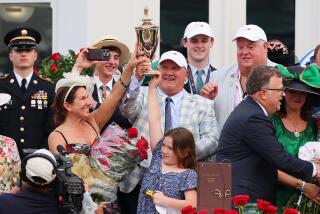Jupiter Island Ventures Out in the Midday Sun, Then Wilts in the Stretch
- Share via
Mad dogs and Englishmen go out in the midday sun. --Noel Coward
By 4 p.m. Sunday, even the dogs, mad or not, had had enough. They’d sought out whatever shade they could find in the barn area at Santa Anita.
Not so the Englishmen. There they were, still out in the sun, and apparently none the worse for wear.
Lord Tavistock, perhaps not cool but certainly calm and collected, surveyed the scene at Barn 122 and appeared satisfied.
Clive Brittain, bearing up well under temperatures that climbed into the mid-90s, said it certainly made a change from England, where rain has been the norm all spring.
And Jupiter Island, the horse that had brought both men--owner and trainer--across the Atlantic, seemed equally indifferent to the heat.
The only one, in fact, who showed any sign of wilting was George Parker, but then that was understandable--he was the one doing the work.
Parker has been Jupiter Island’s primary handler since the 7-year-old was a yearling, and now he was preparing him for his West Coast debut in the $400,000 San Juan Capistrano Handicap.
Jupiter Island, a handsome bay with an impressive racing record in Europe, behaved well during his final pre-race grooming. He behaved well in the receiving barn. He behaved well everywhere, in fact, except in the saddling enclosure, where he bucked and kicked his heels and generally made it known that he was there.
This seemed like the sign to many in the crowd of 50,650, and the fans sent him off as their 5-to-1 third choice.
On the surface, it seemed like a mistake. After all, there was more than one factor working against the English-bred son of St Paddy and Mrs Moss. For example:
--The San Juan Capistrano was Jupiter Island’s first race of the year; his first, in fact, since he finished third in the Washington D.C. International at Laurel on Nov. 16.
--It was his first competitive outing under Laffit Pincay, although the jockey had given him a seven furlong workout on Friday, clocking 1:29 2/5.
--It was his first appearance at Santa Anita, where a race of about 1 3/4 miles on the turf course is a stiff enough test even without the heat.
--He would be running less than a week after arriving in California. This factor was dismissed by Brittain, however, who said the horse travels well and adapts even better.
--Most important of all, he would be running with a minor injury, one that in the end would make the difference. This, however, was not known until after the race.
Pincay and Jupiter Island got off to a good start, breaking cleanly from the gate and immediately settling into stride. But the race did not set up as Brittain had hoped it would.
Instead of staying just off the pace in third or fourth place as Pincay later said he had wanted the horse to do, Jupiter Island dropped back a little and was running seventh in the 10-horse field coming down the hill. At one point, he fell nine lengths back.
Gradually, Pincay moved him up, taking perhaps a wider route than he would have preferred but staying out of trouble. By the time they made the turn for home, Jupiter Island seemed positioned to challenge.
“I thought we could win but he tired at the finish,” Pincay said afterward.
And so it was that after traveling 6,000 miles by air, another 50 or so by road and the final mile and three-quarters under his own power, Jupiter Island finished third, beaten by the favorite, Dahar, and a mare, Mountain Bear, who had never before lost at Santa Anita.
A disappointing result? Not according to Brittain.
“He clipped his heel earlier and got a quarter crack we had to patch,” the trainer said. “He was feeling it and not running like himself. He ran a marvelous race under the circumstances. You can’t be too disappointed.”
And so Jupiter Island headed back to the barn, before heading back to the airport, before heading back to England.
And still the sun beat down upon the track. And upon the Englishmen. But not upon the dogs.
They’d found the shade. They weren’t mad, after all.
More to Read
Go beyond the scoreboard
Get the latest on L.A.'s teams in the daily Sports Report newsletter.
You may occasionally receive promotional content from the Los Angeles Times.










